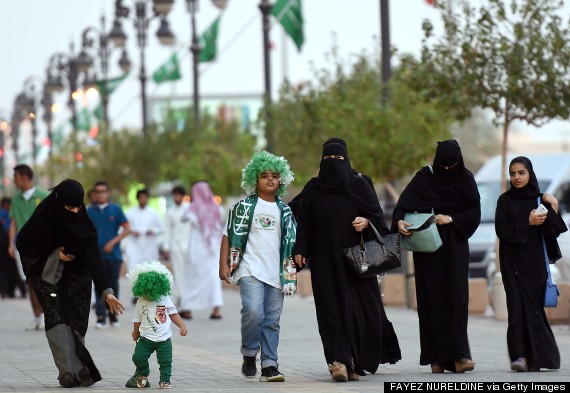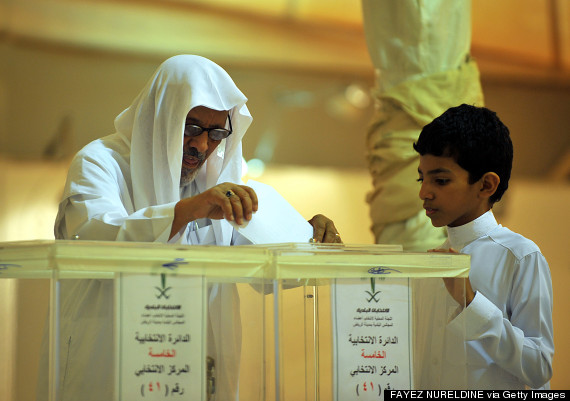
By EMILY CADEI -- OZY
Saudi Arabian women’s headline-grabbing 2011 driving protests were a seminal moment for women’s rights in this ultraconservative Muslim country. Next year, they’ll finally get to taste the fruits of that activism — though not quite in the way they were shooting for.
The protests, which featured dozens of women taking cars out for a spin and sharing videos or images of their civil disobedience on social media, didn’t earn women the right to get behind the wheel. But close watchers of Saudi Arabia’s internal politics believe that the driving incidents are a reason why Saudi King Abdullah and his government gave in on another front — political participation. In the municipal elections slated for next year, Saudi women will get the chance to vote and run for office for the very first time. And while experts predict that their franchise will have little effect on the day-to-day realities in the kingdom, most believe it’s a very big deal for women themselves, if only as a step in the gradual softening of gender-based restrictions that bar Saudi women from virtually all elements of public life.
“What is changing now in Saudi Arabia is that even the simple, average Saudi citizen, the simple woman, the simple homemaker, is now aware of her civil rights,” one women’s rights activist based in Saudi Arabia told OZY, via translation and on the condition of anonymity.
 Saudi women and children attend the celebrations marking the 84th Saudi Arabian National Day in Riyadh, Sept. 23, 2014. (FAYEZ NURELDINE/AFP/Getty Images)
Saudi women and children attend the celebrations marking the 84th Saudi Arabian National Day in Riyadh, Sept. 23, 2014. (FAYEZ NURELDINE/AFP/Getty Images)
From a Western perspective, it can be hard to see how anyone could get too excited about “civil rights” in Saudi Arabia, an absolute monarchy where Abdullah and his family members control all decision making. Political entities like municipal councils have very little real power. Just half of the council members are elected, for example, while the rest are appointed, and councils don’t control their regional budgets. That’s why Prof. Gregory Gause, head of the International Affairs Department at Texas A&M’s Bush School of Government and Public Service, doesn’t think women’s right to vote in municipal elections will have much effect. As for female candidates, “I’m sure we’ll see some … and they will lose,” he says.
Still, the Saudi rights advocate says that many women there are excited about the change. Some activists, she says, are even holding secret workshops to help Saudi women, so long barred from civic life, learn about the voting process. So far, they’ve managed to avoid detection by the government, which considers large political gatherings illegal. And even though the vote hasn’t been scheduled yet, Caryle Murphy, a journalist who spent three years in Saudi Arabia and wrote a book on the country, A Kingdom’s Future, insists it’s “a big step.” She attributes it to King Abdullah. But while agreeing that Abdullah has helped women to take on a greater role in public life, Gause says he’s starting from a very low bar in Saudi Arabia — a “pre-medieval” one, in fact.
Abdullah, who’s now 90, has been cautious in pursuing his agenda on women, careful to take steps incrementally and to avoid inflaming conservative Muslims. They’re a vocal force in the kingdom and view an expansion of women’s roles outside the home as a violation of Islamic law. Allowing women to drive would have provoked the conservative Muslim constituency. It “is really the third rail,” says Gause. “It’s become such a symbolic thing in Saudi; it unites everyone from the al-Qaida types to the clergy.”
 A Saudi man casts his ballot at a polling station in Riyadh on Sept. 29, 2011. (FAYEZ NURELDINE/AFP/Getty Images)
A Saudi man casts his ballot at a polling station in Riyadh on Sept. 29, 2011. (FAYEZ NURELDINE/AFP/Getty Images)
The king and his government largely ignored the driving protests that started in June 2011. But just three months later, they announced a new set of reforms, allowing women to vote and run in the 2015 municipal elections — which themselves were an initiative started in the last decade to grant Saudis more direct political participation. Abdullah also announced plans to appoint women to his advisory Shura Council, the closest thing Saudi Arabia has to a legislature. Thirty women were sworn in to the 150-person council in February 2013.
Now there are signs that even driving, the sacredest of cows, could be at risk of being gored. According to press reports earlier this month, the king’s Shura Council has secretly recommended that the country drop its ban on women driving, under certain circumstances (e.g., only women over 30, who wore no makeup, could get behind the wheel between 7 a.m. and 8 p.m.). Of course, it’s up to the king and his closest advisers to follow through. That’s also true for the elections. In the past, the municipal elections have been delayed, and they could well be again next year. Murphy says the government could create a logistical nightmare for women trying to vote and run for office, limiting their impact.
Will the standards for getting on the ballot be reasonable? Will polling places be accessible to women? No one is expecting a perfect outcome or a sea change in Saudi politics, whenever these elections take place. But as Murphy sees it, it’s part of a broader social movement toward increasing women’s participation in the workforce, in business and in public life. And “that’s not going to change or stop.”